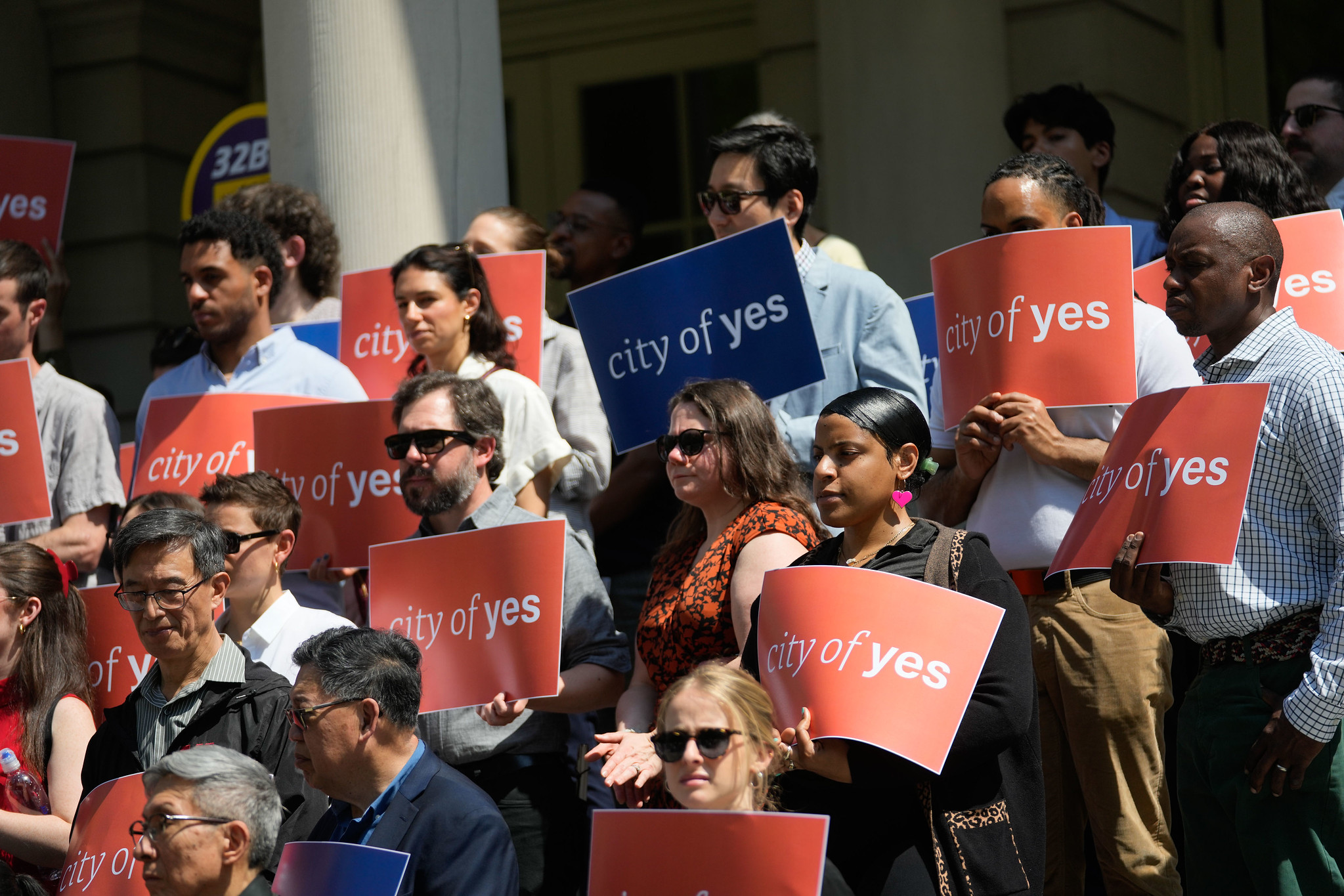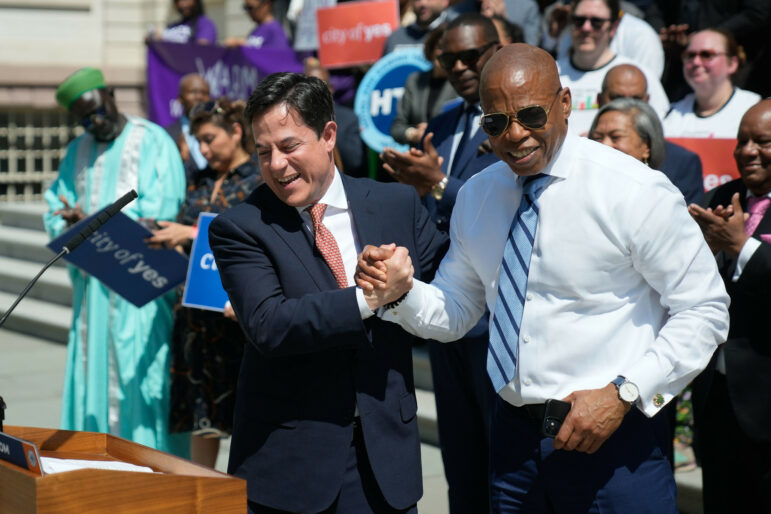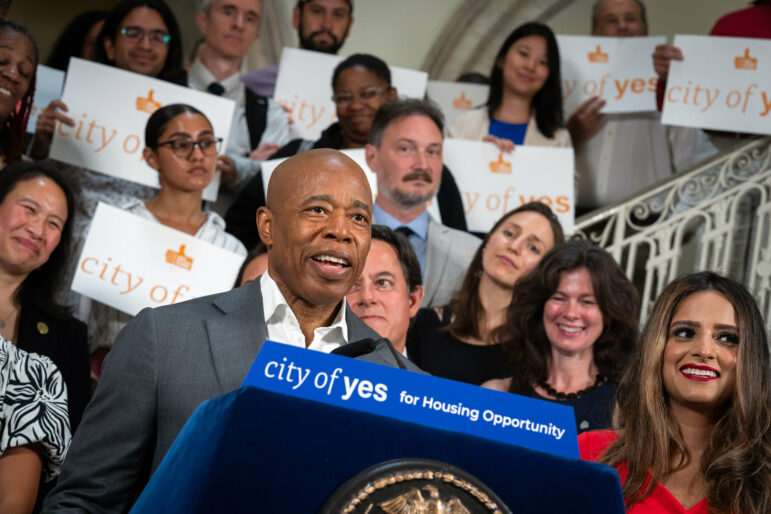The City Planning Commission Wednesday approved the package of zoning reforms with some modifications, including exempting NYCHA campuses from a proposal that would make it easier to build infill housing. The plan is headed to the City Council next for a final vote.

Michael Appleton/Mayoral Photography Office
A mayor-hosted rally outside City Hall in April, in support of the City of Yes for Housing plan.The City Planning Commission Wednesday voted to approve Mayor Eric Adams’ City of Yes for Housing Opportunity plan—a wide-ranging package of zoning reforms aimed at making it easier to construct residential units, as the city grapples with a housing shortage and record-high homelessness.
The proposal will head for a vote in the City Council next, the final step in a public review process that kicked off in April. Its apex comes during a particularly stormy period for the Adams’ administration, with several high-ranking officials enmeshed in a number of federal investigations. The mayor’s schools chancellor announced plans to retire Tuesday, following recent departures from the NYPD commissioner and the city’s top lawyer.
But City Hall dismissed concerns this week that the scrutiny will impact the success of the mayor’s signature housing plan, which officials describe as an effort to update decades of restrictive zoning rules that have stymied growth and fueled rising costs of living.
“People need housing,” Adams said at a press briefing Tuesday, when asked how he thinks councilmembers will receive the plan. “Everyone is going to have to, you know, vote with their conscience.”
The proposal, billed by the administration as a path to “address the housing crisis by making it possible to build a little more housing in every neighborhood,” is a sweeping one, with the annotated draft zoning text running nearly 1,400 pages. The plan has already been reviewed by all five borough presidents—four of whom came out in favor of it—and most of the city’s 59 community boards, where it’s faced significant criticism in many outer borough neighborhoods.
City of Yes for Housing has eight main elements, including making it easier to build accessory dwelling units, shared housing models and office-to-residential conversions. It would once again allow the construction of homes above commercial shops in low-density areas where that has since been zoned out, and for larger buildings—from three to five stories—near subway stations and other transit hubs.
The plan would eliminate minimum parking requirements for new development, which critics say complicates and drives up the cost of building, and offer a 20 percent density bonus for developers who build residential in certain neighborhoods, as long as the extra housing is income-restricted.
"For decades, we simply have not built enough homes to keep up with demand," City Planning Commission Chair Dan Garodnick said at Wednesday's hearing, ahead of his "yes" vote. He cited a series of statistics illustrating the severity of the crisis: the 1.4 percent rental vacancy rate, how half of city renters spend a third of their income on housing, and how each affordable housing lottery sees "tens of thousands" of applications.
"When there aren't enough homes to go around, New Yorkers suffer: from high rents, displacement and gentrification pressure and homelessness, while homeownership becomes increasingly unattainable," he said. "We have the power to update our outdated rules and generate the homes New Yorkers need across the city."

Michael Appleton/Mayoral Photography Office
City Planning Director Dan Garodnick and Mayor Eric Adams at a rally in support of the housing plan in April.The version of City of Yes approved by the Planning Commission included some modifications, including exempting NYCHA campuses from the "infill" proposal, which aims to make it easier to build housing on zoning lots with existing buildings, such as campuses owned by educational institutions or religious organizations.
Public housing is subject to federal land use rules, and NYCHA is already pursuing specific developments projects on its own under those regulations, John Mangin of the Department of City Planning told commissioners ahead of Wednesday's vote.
"Given the pace of positive outcomes from this process in recent years, the department does not want to upset what has become a very delicately balanced, multi-layered, tenant-focused process," he said of the exemption.
DCP also opted to tweak a provision under the 20 percent density bonus that allows developers to build the extra affordable housing off-site, but which would've had a 10-year time limit. That "sunset" period was eliminated for projects in so-called R-10 districts, which have the highest residential density in the city.
The City of Yes plan was adopted with 10 commissioners voting in favor, and three voting against it. Opposition voices included Commissioner Leah Goodridge, a former tenant attorney who said the plan fails to address "the lack of true affordable housing."
"The affordability piece here is very modest, and it is a preference," she said, zeroing in on the 20 percent density bonus, under which developers who opt to use it must set aside the extra units for households earning 60 percent of the Area Median Income (AMI)—$83,880 a year for a family of three. "That's still moderate income," Goodridge said.
"I feel strongly about the affordability piece, because I spent 12 years as a tenants rights attorney listening to low income New Yorkers—tenants who are Uber drivers, who are home health care workers—who are looking for housing or being evicted and can't find anything," she added.
"Is this plan going to make that better? I don't think so," Goodridge said. "I think what it will do is make it slightly better, but it's certainly not a big plan."
Other commissioners took issue with other aspects of the plan. Some argued that the removal of parking mandates would disproportionately impact residents in outer borough neighborhoods with fewer transit options (though others noted that developers could still choose to build parking, they'll just no longer be required to). Some who voted in favor nevertheless urged members of the City Council to undertake their own modifications to the proposal, as it heads into the final leg of public review.
"City of Yes definitely has some terrific potential. At the same time, there are some issues. That said, in my mind, we can't let the perfect be the enemy of the good," Commissioner David Gold said before casting his "yes" vote.
"The changes embedded in City of Yes have the potential to add over 100,000 homes," he added. "It'll take some time for us to see the benefit, but we have a responsibility to do everything we can to increase housing availability."
To reach the reporter behind this story, contact Jeanmarie@citylimits.flywheelstaging.com.
Want to republish this story? Find City Limits’ reprint policy here.








